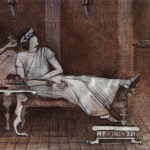This technology was recently put to great use by our Consult Service team in identifying the cause of a near catastrophic sterile endocarditis in a 53-year-old male with longstanding seronegative arthritis treated with methotrexate. Following his valve-replacement surgery, he became critically ill with an orchitis, myositis and severe ocular inflammation. Although myriad tissue cultures were frustratingly negative, the culprit responsible for his debilitating illness, Tropheryma whipplei, could not evade the massive searchlight cast by MDS. The team was awestruck by the discovery that his undiagnosed Whipple’s disease explained all his clinical findings. Imagine that!
Bringing the Bench to Jurassic Park
Several other research innovations will likely advance the promise of translational research into a clinical reality. Perhaps none is more promising than the gene-editing tool known as CRISPR that can remove snippets of a gene sequence that are deleterious to the host and replace them with corrected genetic material. Studies are underway to correct the genetic flaws responsible for Duchenne muscular dystrophy and common causes of infantile blindness. In fact, the actress Jennifer Lopez is the executive producer of an upcoming CRISPR-themed bio-crime drama on the NBC television network.9
Perhaps an even more eye-catching idea for CRISPR is the proposal put forward by one of the eminent researchers in this field, George Church, PhD, professor of genetics at Harvard Medical School in Boston. Dr. Church’s lab has been prolific in this area, but one of their projects is particularly stunning: since 2015, his group has been using CRISPR to resurrect the wooly mammoth and repopulate the northern Eurasian tundra with these animals to restore the tundra to an arctic grassland, preserving the earth’s permafrost and new world!
I hope Steven Spielberg can be persuaded to put this story to film. Unlike Jurassic Park, it won’t be a science fiction movie—it will be a documentary.
 Simon M. Helfgott, MD, is associate professor of medicine in the Division of Rheumatology, Immunology and Allergy at Harvard Medical School in Boston.
Simon M. Helfgott, MD, is associate professor of medicine in the Division of Rheumatology, Immunology and Allergy at Harvard Medical School in Boston.
Some Final Words

vectorfusionart / SHUTTERSTOCK.COM
Dear Readers,
This is it. After filing this, my 72nd Rheuminations column, it’s time to move on. It’s been a remarkably fulfilling and joyous experience for me. I was handed the rare opportunity to write about “stuff,” topics of interest to our community of rheumatologists, without any impositions. I am truly grateful to the ACR and its wonderful staff, especially Joan Roth and Rachel Whittaker, the members of the Communications and Marketing Committee, and our presidents, past and present. Together, we have witnessed the continued growth of The Rheumatologist, which has risen to become the most read periodical in rheumatology today.

